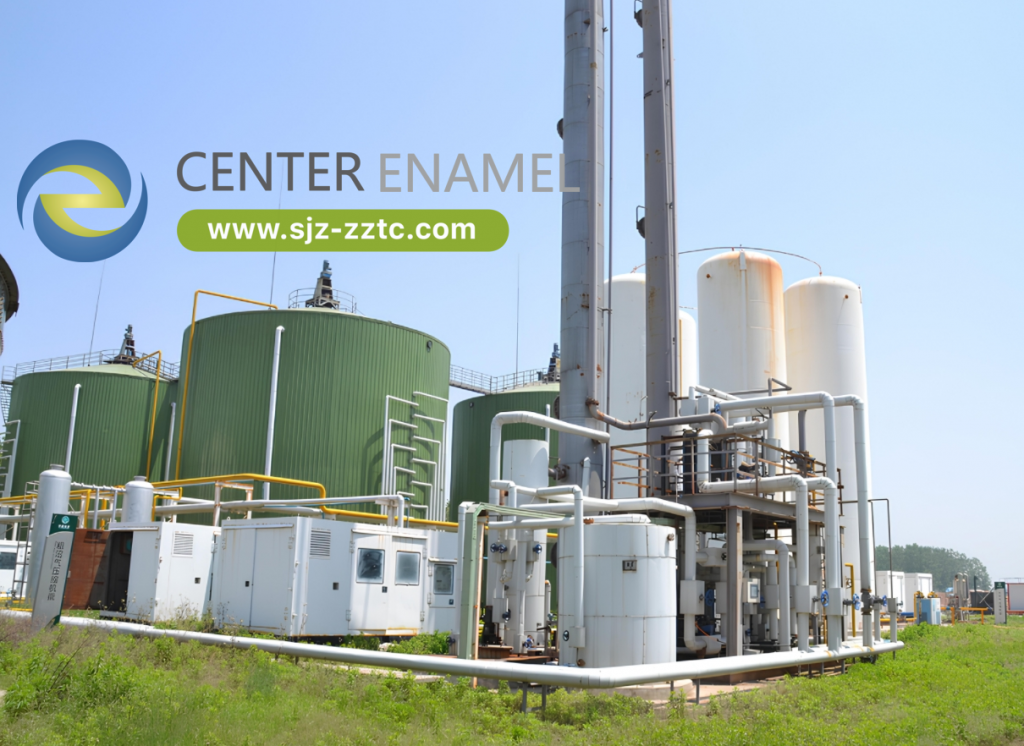Optimized Continuous Stirred Tank Reactor for Food Processing Wastewater Management

Food processing industries generate significant amounts of wastewater containing organic matter, fats, oils, and suspended solids. Effective treatment of this wastewater is crucial to meet environmental regulations and reduce operational costs. The Continuous Stirred Tank Reactor (CSTR) has emerged as a highly efficient solution for food processing wastewater management. Designed to optimize biological treatment processes, Center Enamel’s CSTR systems offer superior efficiency, durability, and adaptability for diverse wastewater treatment applications.
A Continuous Stirred Tank Reactor (CSTR) is a type of anaerobic digestion system where wastewater and microorganisms are continuously mixed to enhance biodegradation. The reactor maintains a stable environment for microbial activity, allowing for efficient breakdown of organic pollutants. This process not only treats wastewater but also produces biogas, which can be used for energy generation, making CSTR an environmentally and economically sustainable solution.
Key Features of an Optimized CSTR for Food Processing Wastewater
1. Advanced Mixing System for Maximum Efficiency
Efficient mixing is essential in CSTR systems to ensure uniform distribution of microorganisms and nutrients. Our reactors utilize:
- High-efficiency impellers for continuous agitation, preventing sludge accumulation.
- Automated control systems that adjust mixing intensity based on real-time wastewater conditions.
- Optimized hydraulic retention time (HRT) to maximize pollutant removal efficiency.
2. High-Performance Materials for Durability
Food processing wastewater often contains acidic or corrosive compounds. Center Enamel’s CSTR tanks are constructed using:
- Glass-Fused-to-Steel (GFS) Technology: Provides superior corrosion resistance and longevity.
- Fusion Bonded Epoxy Coatings: Ensure additional protection in aggressive wastewater environments.
- Stainless Steel Components: Enhance durability and maintain hygiene standards required for food industry applications.
3. Biogas Recovery for Energy Efficiency
One of the biggest advantages of using a CSTR system is its ability to capture biogas from anaerobic digestion. Center Enamel’s CSTR features:
- Integrated biogas collection domes for efficient gas capture.
- Gas-tight seals to prevent leaks and ensure safety.
- Optional biogas utilization systems that allow energy recovery for plant operations.
4. Scalability and Modular Design
Our CSTR solutions are designed to adapt to varying wastewater volumes. Features include:
- Modular expansion capability to accommodate increased wastewater loads.
- Customizable reactor sizes to meet specific food processing plant needs.
- Flexible installation options for both new and existing treatment facilities.
5. Automated Monitoring and Control
Center Enamel’s CSTR systems are equipped with intelligent process control systems that:
- Continuously monitor pH, temperature, and gas production.
- Optimize microbial activity to enhance treatment efficiency.
- Alert operators to process fluctuations, ensuring consistent wastewater treatment performance.
Applications of CSTR in Food Processing Wastewater Treatment
1. Dairy Industry Wastewater Treatment
Dairy processing plants generate wastewater rich in fats, proteins, and lactose. CSTR effectively breaks down these organic components, reducing COD (Chemical Oxygen Demand) levels and preventing environmental pollution.
2. Beverage Manufacturing Wastewater
Soft drink, juice, and alcohol production generate high-sugar wastewater, which can be efficiently treated in a CSTR while producing biogas for energy use.
3. Meat and Poultry Processing Wastewater
Containing high levels of organic matter and suspended solids, wastewater from meat and poultry processing requires efficient digestion. CSTR’s continuous mixing ensures rapid decomposition of these pollutants.
4. Fruit and Vegetable Processing
Processing fruits and vegetables generates wastewater with high levels of organic solids. CSTR systems accelerate decomposition, allowing for efficient water reclamation and biogas production.
Benefits of Using Center Enamel’s CSTR for Food Processing Wastewater
1. High Treatment Efficiency
Our CSTR systems provide consistent and high removal rates for organic pollutants, ensuring compliance with environmental discharge standards.
2. Cost-Effective Wastewater Management
By integrating biogas recovery, food processing plants can reduce energy costs and offset wastewater treatment expenses.
3. Reduced Sludge Production
Unlike conventional treatment methods, CSTR minimizes sludge generation, reducing disposal costs and operational complexities.
4. Long-Term Durability and Reliability
Using high-quality materials and corrosion-resistant coatings, our reactors ensure long service life with minimal maintenance requirements.
5. Sustainability and Environmental Compliance
With biogas generation and energy recovery, CSTR aligns with sustainability goals while helping industries meet stringent environmental regulations.
Why Choose Center Enamel for CSTR Solutions?
- Over 30 Years of Expertise in providing industrial wastewater treatment solutions.
- Global Reputation, with successful installations in more than 100 countries.
- Custom-Engineered Solutions, tailored to meet the specific needs of food processing plants.
- Advanced Manufacturing Facilities, ensuring quality and reliability.
For food processing industries seeking an efficient, sustainable, and cost-effective wastewater treatment solution, Center Enamel’s optimized Continuous Stirred Tank Reactor (CSTR) is the ideal choice. By integrating advanced mixing, durable materials, biogas recovery, and intelligent monitoring, our CSTR systems enhance wastewater treatment efficiency while reducing operational costs.
Contact Center Enamel today to learn more about how our CSTR technology can improve your food processing wastewater management.
